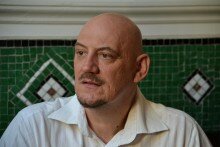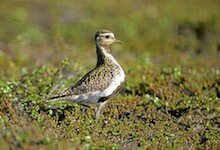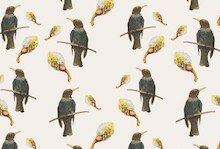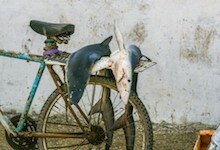
Kobus Moolman was born in 1964, and currently lives in Pietermaritzburg. He has published five individual collections of poetry: Time Like Stone (University of Natal Press, 2000); Feet of the Sky (Brevitas, 2004); Separating the Seas (University of Kwazulu-Natal Press, 2007); Light and After (Deep South, 2010) and Left Over (Dye Hard Press, 2013). He has also published two collections of plays, as well as editing the journal Fidelities from 1995 until 2007 and the anthology Tilling the Hard Soil (UKZN Press, 2010), containing poetry, prose and art by South African writers living with disabilities. In this period he has received several awards, including the Ingrid Jonker Prize, the South African Literary Award for poetry and the BBC African Theatre Award. At present he works as an academic in English Studies at the University of Kwazulu-Natal in Durban.
He is one of those South African poets whose work shows a consistent and powerful inclination to explore new ground in both its form and content. He cites as influences a wide range of contemporary cultural ideas and figures, among them Japanese Butoh, the Tanztheater of Pina Bausch, non-representational art and disability studies. Among the writers who influence his work he names Paul Celan, Anne Carson, Robert Kroetsch, Inger Christensen, Thomas Bernhard and the South African poet Karen Press.
“Much of my recent poetry,” he says, “is driven by a personal engagement with the concept of embodiment, and particularly two aspects [. . .] firstly, a concern with the interface between the inside and the outside, and secondly, a concern with the non-normative body” (Moolman, personal communication). In pursuit of this, he uses a variety of techniques. He is a master of the lyric, but a lyric in which human figures much of the time seem overwhelmed by the landscapes, objects and natural world with which they are surrounded. ‘Ballad of a Soft Man’, for example, ends with the figure of a “Soft man slumped / into a corner of the sky; // leaking stray birds / and stuffing”; while, in ‘Auto da fé’, a minimally described landscape contains “an old fire [which] burns / a dead man’s dreams”. The poet characteristically uses short descriptive lines and sentences which are diverted from the merely factual by incisions of metaphoric language, which act as a powerful force for estrangement from the normative. This is conjoined with an elliptical, laconic style which favours short, repetitive observations gradually growing and inching forward towards conclusions which, even though also given as succinct statement and in a flat tone, nonetheless startle.
In both forms above what is displayed, strangely enough, is heightened sensibility. Despite the cinematic nature of the descriptions and the disembodied, neutral tone employed, inanimate objects reveal unexpected and threatening sides, and are inscribed with emotional power. “The tension in my work,” Moolman notes, “is to avoid the twin pitfalls of reductionism and inscrutable subjectivity” (Moolman, a personal communication); and, despite the use of cryptic observation the emotion of the narrator is palpable. Often the conclusions of poems do not so much resolve meaning as reveal scars of memory and belief and – finally – a realisation of the implacability of life. The poems’ narrators strive to decipher what is made manifest for hidden meanings, usually in vain. This leaves the reader with an apperception of the need to survive and endure in a world where everything threatens to fly out of control. No emotion or object is co-ordinated except, jaggedly, through the poet’s suturing; it is impossible to resolve boundaries between objects in this poetic universe.
Moolman is also one of the few recent South African poets who has attempted to use the prose poem. On occasion his poems can also be concatenations of headlines, lists, spam messages; while, elsewhere, he has written poems as monologues for one speaker, or which describe interactions between two figures, male and female. The banal, disordered nature of quotidian life and the difficulty of human communication emerge as themes; the words and actions figures use to lull themselves uncover, eventually, a painful dissociation of affect (“SHE says: Plug me in. / There. Fill me up. Switch me on. Here. And I’ll purr for you like an over-locker. / See how I run” (‘Daily Duty’). The boundaries of personal life are dragged inexorably into an uncaring universe where boundaries between self and other have broken down. There is no haven in a world where human interactions have uncertain results and requires courage.
The interconnections the poet evokes are not simply and merely metaphorical. In many poems, the materiality of the body – which is often a body in the process of dismembering from itself, or being dismembered – segues into the natural world, other objects, or the social world and history. This may also happen in reverse. It is a poetry of connections and relationships; but these are often incongruous, blurring with or being invaded by forces and objects outside their control. These remain impervious to will or desire: in fact, human will may lead to, or come up short against the barrier of, incapacity. The general urge – of objects, natural phenomena, social relationships and even parts of the body – is centripetal: and, when and where the fragments interlock, they do so in what appear, initially, surprising ways.
A recent poem, ‘Time is running out . . .’, manifests a number of aspects of his style:
There is no time for long sentences.
No time for long stories anymore.
It is just fragments now.
Hurried phrases.
Snatches of words that dash across the white light.
Words that dare not think.
They have no time anymore to think or prepare.
That have to just be themselves.
Even if they aren’t ready.
This is his work.
There won’t be any other book – any other story.
This is his story.
His last story.
(‘Time is running out . . .’)
The epigraph of one of his poetry collections (‘Then all the people of the Gerosenes asked Jesus to leave them, because they were overcome with fear. So he got into his boat and left” (Luke 8: 37)) is a clue. If anything, the poet seems to see himself living in a society without grace, where belief and faith have abandoned human beings because they are overcome by fear. The analogies to elements of contemporary South African experience for many people are difficult to deny.
It is difficult, at first exposure, to know how to respond to these poems, except with stunned silence. Nevertheless, painful as this process of living is, it is not the whole picture. On closer examination, the numinous does reveal itself, fleetingly but consistently, in and through unexpected quarters and substances. Through the process and action of the poem, these fragments of belief and perceptions I have noted begin to create strange new forms and shapes and unexpected, apt perceptions. Faith and trust, then, are not absent; but they are always painfully sought, and never completely found. If hope can be gleaned from this, it is in a clear-sighted apperception of this fact. He notes “We who accept survival as our password / Accept incompleteness as our blessing.” (‘Survival’).
Elsewhere, as method, the narrator suggests “sit still long enough and sooner or later enough words will come wandering by to fill up a blank page. The trick is in the waiting” (‘Standing shots’). Patience, humility and a clear perception: Moolman has this in abundance, and his poems broadcast their importance. In a world where poems are too often simply sound-bytes for fleeting perceptions and states of mind, his poetic and oeuvre require a commitment from its readers. Such commitment is amply rewarded, time after time. The reader will emerge from this poetry chastened, but delighted. These are works of acumen, depth and extraordinary pressure.
PUBLICATIONS
Poetry
Left Over, Dye Hard Press, Johannesburg, 2013
Light and After, deep south, Grahamstown, 2010
Anatomy, Caversham Press, Lidgetton, 2008
(Hand-made chapbook with illustrations by Witty Nyide. Limited edition)
Separating the Seas, University of KwaZulu-Natal Press, Pietermaritzburg, 2007
Feet of the Sky, Brevitas Press, Howick, 2003
Time Like Stone, University of Natal Press, Pietermaritzburg, 2000
Plays
Blind Voices: a Collection of Radio Plays, Botsotso Publishers, Johannesburg, 2007
Full Circle, Dye Hard Press, Johannesburg, 2007
Edited Anthology
Tilling the Hard Soil: Poetry, Prose and Art by South African Writers with Disabilities, UKZN Press, Pietermaritzburg, 2010
POETRY ONLINE
Poems and article at Peony Moon
‘List of Shots I, II and III' at Wordgathering
Review of Light and After by Moira Richards at Rattle
Six poems at African Writing Online
Six poems at Other Voices
Poems and essays at The Common Online
Poems at Itch
‘Veld Cemetary, Carnavon’, a poem at Books LIVE
‘Watched’, a poem at Books LIVE
A selection of poems from Light and After
A selection of poems from Anatomy
A selection of poems from Separating the Seas
A selection of poems from Feet of the Sky
One version of ‘The Road’ on Litnet
Another version of ‘The Road’ on Litnet
First interview with Janet van Eeden on Litnet
Second interview with Janet van Eeden on Litnet
The Dye Hard Interview
Interview with Mike Northern at Wordgathering
Interview with Michelle McGrane
Writing Through the Silence by Anna-Karien Otto
Interview with Sbogiseni Dladla
PRIZES AND AWARDS
2011: Winner of the Inglis House Poetry Contest, Philadelphia, USA.
2010: South African Literary Award for Poetry for Separating the Seas
2009: DALRO Prize for Poetry
2007: Joint winner of best script at the Performing Arts Network of South Africa (PANSA) Festival of Reading of New Writing
2004: Jury Prize for best script at PANSA Festival of Reading of New Writing
2002: Ingrid Jonker Prize for a debut collection of poetry, Time Like Stone
1991: Macmillan Southern African Playwriting Award







